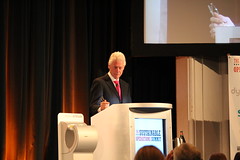 For the last week in April, instead of focusing on my thesis like a responsible master’s student, I was in New York City attending the 2012 Sustainable Operations Summit. It was a sustainability-superstar studded event with impressive panel discussions about how to integrate sustainability into the business model and the importance of the sustainability story.
For the last week in April, instead of focusing on my thesis like a responsible master’s student, I was in New York City attending the 2012 Sustainable Operations Summit. It was a sustainability-superstar studded event with impressive panel discussions about how to integrate sustainability into the business model and the importance of the sustainability story.
But the real highlight of the whole experience was seeing President Bill Clinton speak about energy efficiency. I’ve always heard people say that he is a great public speaker and really commands a room, and I am here to tell you that those statements could not be more true. He was so charismatic, funny, and smart.
 He started his talk with a story about when he was Governor in Arkansas and trying to pass energy efficiency legislation on the state level and was met with a lot of resistance. It is a topic that has followed him throughout his career, working with Al Gore during his presidency, and now as a programmatic focus for his foundation.
He started his talk with a story about when he was Governor in Arkansas and trying to pass energy efficiency legislation on the state level and was met with a lot of resistance. It is a topic that has followed him throughout his career, working with Al Gore during his presidency, and now as a programmatic focus for his foundation.
Of course, the best moment of his talk was when he mentioned the Department of Energy Better Buildings Initiative (shout out to Patrick DiCiaccio, CEP’12, creator of the Better Buildings Case Competition!), which he touted as one of today’s best federal programs. One of the problems, he said, is that our financial systems are not set up for efficiency. We need to recognize and implement more user-friendly solutions, and promote the fact that with energy efficiency all costs are up front and “everything else is as close to free as it gets in life.”
 Seeing President Clinton speak was definitely one of the more exciting things that I have gotten to do in my time at Bard. And listening to what he had to say about the how important energy efficiency is was very inspiring. I hope the people in that room really took his message to heart and start integrating efficiency practices into their business operations. It’s the smart thing to do, the right thing to do, and, not to mention, a former President of the United States just told them that they should do it.
Seeing President Clinton speak was definitely one of the more exciting things that I have gotten to do in my time at Bard. And listening to what he had to say about the how important energy efficiency is was very inspiring. I hope the people in that room really took his message to heart and start integrating efficiency practices into their business operations. It’s the smart thing to do, the right thing to do, and, not to mention, a former President of the United States just told them that they should do it.
– Melissa Provinsal, M.S. ’12